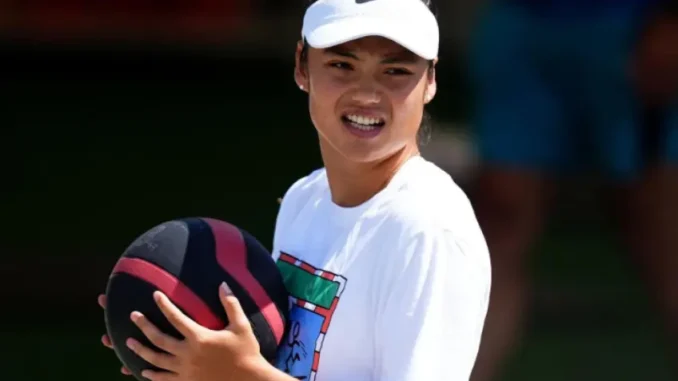
The 2025 Wimbledon Championships have delivered thrilling matches and unexpected twists, but one of the most poignant moments came off the court when Alexander Zverev, the world No. 3, laid bare his struggles with mental health following a shocking first-round exit. The German’s candid revelations about feeling “very alone” and “empty” resonated deeply across the tennis world, prompting reactions from peers, including British star Emma Raducanu. After her own second-round victory at Wimbledon, Raducanu offered thoughtful insights into the mental challenges of professional tennis, shedding light on the pressures players face and the strategies she employs to stay grounded, while expressing empathy for Zverev’s vulnerability.
Zverev’s emotional press conference came after a grueling five-set loss to unseeded Frenchman Arthur Rinderknech, marking his earliest Grand Slam exit since 2019. The 28-year-old, a three-time Grand Slam finalist, admitted to grappling with a profound lack of joy both on and off the court since his defeat to Jannik Sinner in the 2025 Australian Open final. “I feel very alone out there at times. I struggle,” Zverev confessed, his voice heavy with emotion. “I’ve never felt this empty before.” He spoke of considering therapy for the first time, citing personal and media-related difficulties that have left him feeling isolated. “Even when I’m winning, it’s not necessarily a feeling that I used to get where I was happy, over the moon,” he added, highlighting the depth of his emotional turmoil.
Raducanu, fresh off a 6-3, 6-3 win over 2023 Wimbledon champion Markéta Vondroušová, was asked about Zverev’s comments during her post-match press conference. The 22-year-old, who has faced her own share of pressures since her 2021 US Open triumph, responded with compassion and wisdom beyond her years. “It’s a mentally very challenging sport,” she said, acknowledging the relentless demands of the professional tennis circuit. “I think for me, what I’ve found, is trying to surround yourself with good people, trying to win the day, trying to focus on the process as much as possible. I think the results, it’s really difficult to kind of take your joy from the results. Because it’s so up and down. It’s a rollercoaster.”
Raducanu’s approach to mental resilience reflects her own journey through the highs and lows of fame. Since her meteoric rise as a teenage Grand Slam champion, she has navigated injuries, media scrutiny, and the expectations of a tennis-mad nation. Her comments underscore a philosophy of focusing on daily progress rather than tying self-worth to wins and losses—a perspective that resonates with Zverev’s current struggle to rediscover his passion. “You’re losing almost every week,” Raducanu noted, emphasizing the sport’s unforgiving nature. Her words highlight a universal truth in tennis: the constant cycle of competition can erode even the strongest spirits if not managed carefully.
The tennis community has rallied around Zverev, with players like Aryna Sabalenka also offering support. Sabalenka, the world No. 1, shared her own experience with therapy, noting that she worked with a therapist for five years before finding balance through open communication with her team. “If you’re going to keep it inside, it’s just going to destroy you,” she advised, urging Zverev to confide in those close to him. Raducanu’s response, while less prescriptive, echoed this sentiment, emphasizing the importance of a supportive circle. Her own team, including coach Mark Petchey, has been instrumental in her recent resurgence, which saw her climb to world No. 43 after reaching the Wimbledon third round.
Zverev’s openness has sparked broader conversations about mental health in tennis, a sport where players often face intense scrutiny and isolation. His admission that “it’s difficult to find joy outside the tennis court for me at the moment” struck a chord, particularly given his off-court challenges, including past allegations of domestic abuse, which he has consistently denied. These pressures, combined with the emotional weight of high-stakes losses, have left Zverev searching for answers. “I have to solve myself first. I have to solve my issues,” he said, signaling a willingness to confront his struggles head-on.
For Raducanu, the focus remains on her own journey as she prepares to face Sabalenka in a blockbuster third-round match. Her recent performances, including straight-set victories over Mimi Xu and Vondroušová, demonstrate a renewed confidence and technical improvements to her forehand and serve. Yet, her comments on Zverev reveal a player who understands the broader human context of the sport. “When you play an opponent like her, you know you have to play well,” she said of Sabalenka, but her reflections on mental health suggest a deeper awareness of the battles fought beyond the baseline.
Zverev’s vulnerability has not only humanized a player often seen as a stoic competitor but also highlighted the need for greater mental health support in tennis. Raducanu’s empathetic response, rooted in her own experiences, serves as a reminder that even the brightest stars face dark moments. As she continues her Wimbledon campaign, aiming to match or surpass her 2024 fourth-round run, Raducanu’s words offer a beacon of hope for Zverev and others navigating the sport’s mental toll. With the tennis world watching, Zverev’s next steps—both on and off the court—will be a testament to his resilience, while Raducanu’s thoughtful perspective underscores the power of community and process in overcoming adversity.
Leave a Reply